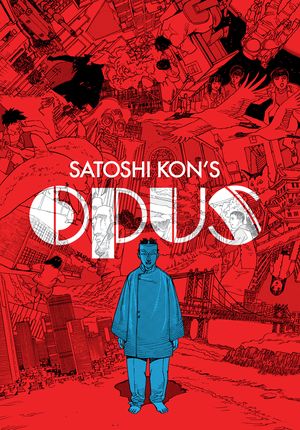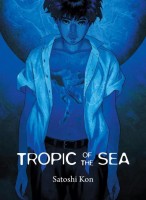It’s not every day that an American publisher releases a manga by the late, great Satoshi Kon, so Brigid and I decided to mark the occasion with a roundtable discussion. Joining us is David Brothers, one our favorite comics journalists. David has written for Comics Alliance, Pop Culture Shock, Publisher’s Weekly, Wired, and The Atlantic Monthly, and currently works in the comics industry.
On our plate: Tropic of the Sea, which was published by Vertical Comics in 2013, and OPUS, which arrives in comic book stores today courtesy of Dark Horse. Both works date to an early stage of Satoshi Kon’s career, but explore themes present in such films as Perfect Blue, Millennium Actress, and Paprika—most notably the boundary between reality and imagination.
KATE: Let’s start the conversation with a basic question: which did you enjoy more, OPUS or Tropic of the Sea, and why?
 DAVID: I definitely liked OPUS a lot more than Tropic of the Sea, I think owing to the fact that while both are stories in well-worn genres, OPUS is way more up my alley in general, since it was at least partly about storytelling as a creator. Tropic of the Sea felt fairly pat, with precious few surprises all the way down to the last panel. OPUS follows the blueprint of other stories in its genre, but it’s also funnier and warmer somehow, I suppose because it’s about the nature of free will and humanity, and to tackle those points you kinda have to have characters that are entertaining to watch.
DAVID: I definitely liked OPUS a lot more than Tropic of the Sea, I think owing to the fact that while both are stories in well-worn genres, OPUS is way more up my alley in general, since it was at least partly about storytelling as a creator. Tropic of the Sea felt fairly pat, with precious few surprises all the way down to the last panel. OPUS follows the blueprint of other stories in its genre, but it’s also funnier and warmer somehow, I suppose because it’s about the nature of free will and humanity, and to tackle those points you kinda have to have characters that are entertaining to watch.
I actually read these books back-to-back the first time I read both, Tropic of the Sea and then OPUS, with a break for cooking and dinner in-between. OPUS did a great job of sparking my imagination. I think it’s cool that the story works as both how we read it, as the story of a creator in his creation, and also a crazy deus ex machina ending for the manga Resonance. Tropic of the Sea sorta is what it is, which is a well-executed story to be sure, but OPUS goes places I really enjoy.
BRIGID: Wow, I’m actually feeling the opposite: I really liked Tropic of the Sea because I thought that it was very well done, even if the story had been done before. I’m finding OPUS much harder to follow, though. Maybe I’m just not good with action stories, but it seems like things are constantly exploding and flying apart without any visible cause. And right at the end of chapter 1 there’s this weird non-sequitur where Satoko’s leg is trapped under a stone column and then, without anything changing in the panel that I could see, she just pushed it off and jumped up. On the one hand, this manga has a pretty sophisticated sense of space, but on the other hand, I’m having a lot of trouble following the motion of people and things within that space, and in particular, why things are blowing up. As I write this, I haven’t finished the manga, so maybe there’s a resolution or explanation I’m not seeing yet, but right now it’s pulling me out of the story to have to stop and figure out what just happened. It’s weird, too, because you would expect an animator to be tighter about that kind of thing.
As for OPUS, it irresistibly reminded me of the a-ha video for “Take on Me” and the Will Farrell/Emma Thompson flick Stranger Than Fiction, with a pinch of AKIRA for seasoning. I normally find these kind of meta-exercises tedious, but Kon infuses the story with a sense of playful urgency that thwarts the urge to deconstruct every page. (For me, at least; your mileage may vary.)
DAVID: Oh, I’m definitely knee-deep in that urge to deconstruct. Resonance feels like the anime and manga that was around when I was getting into this stuff, something halfway between Ryoichi Ikegami’s ’80s realism and Masamune Shirow’s willingness to blend weird tangents into his hard sci-fi worldbuilding. The haircuts, the fashion, the motivations, the poorly thought-out backstories, and somehow even the fourth wall breaking action are all my bag. Which I think is a big part of why I share the constant feeling of Things Are Happening All Over with you, Brigid, but have a different response to it. The story-in-the-story is something I know well and have read often (the cop mentor, the thug friend, the weird way the heroine keeps getting rescued instead of rescuing!), so I buy into that, and through that the rest of the story, maybe a little harder than others would. This feels a lot like a lost chapter of a comic I never read as a kid, from late enough in the story that doing a daring metafictional “let’s talk about comics stories by way of being in a comics story!” tale was not just feasible, but something you could dedicate 300+ pages to.
KATE: I agree with Brigid that the draftsmanship in Tropic of the Sea is crisper—in fact, I think that’s part of the reason that I’m so focused on the creakier aspects of the story. The illustrations are almost… well, “invisible” isn’t quite the right word, but they don’t call attention to themselves in the same way that the illustrations in OPUS do. I don’t always respond well to flashy artwork, but I found OPUS engaging enough that I didn’t linger on the busier images.
As for the story, I’m with you, David: OPUS is a fun throwback to the kind of manga that Dark Horse and VIZ were publishing in the 1990s, right before the Sailor Moon/InuYasha revolution. OPUS isn’t as gonzo as some of the Koike/Ikegami manga from that era, but it still has that same breathless, hyperbolic quality. I’m kind of surprised that I liked it better than Tropic of the Sea, actually, as Tropic seems like it would be more in my wheelhouse. But I thought the script was too on-the-nose—a little ambiguity would have made the ending more satisfying, and more in keeping with Kon’s mature work. (An aside: I wondered what Rumiko Takahashi could have done with the premise of Tropic of the Sea… sigh.)
Switching gears, how did you react to the ending? Was Dark Horse right to include Kon’s unfinished sketches, or should the manga have been left incomplete?
DAVID: I came into OPUS cold, not even knowing it was unfinished, so I was both surprised, disappointed, and glad to see them. Surprised at the lack of an ending, disappointed at the same, but glad there was some kind of resolution, even if it’s just a metafictional one. For a story about stories to end with “Welp, and I guess I just didn’t finish this one, but I might one day!” is the kind of serendipity you can’t plan for, but is sometimes thematically correct for the work. It worked here, and I especially liked to see the pages Kon did with no faces. I thought that was a cool and creepy touch, and when combined with the rest of the backmatter, it made for a satisfying, though not all the way satisfying, ending.

